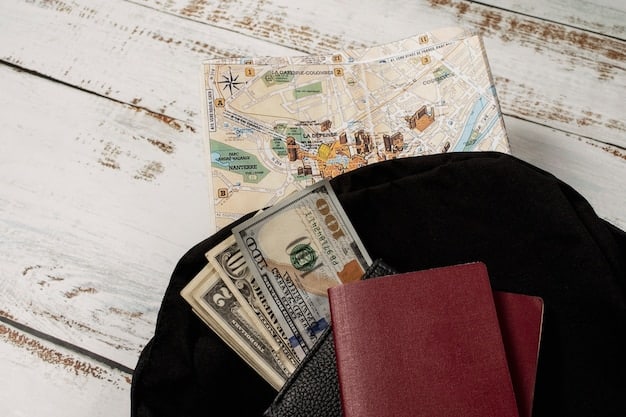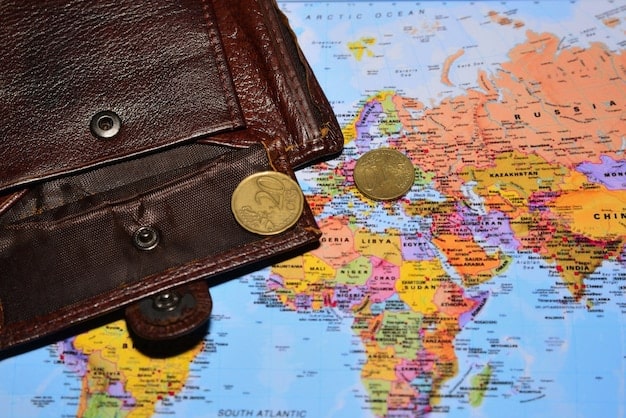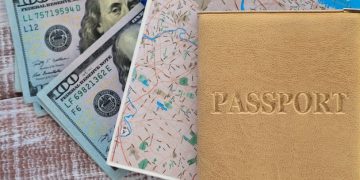US Passport Renewal Fee Hike: 2025 Intl Travel Budget Impact.

The newly announced 18% increase in USCIS passport renewal fees will directly impact the 2025 international travel budgets of U.S. citizens, necessitating careful financial planning to absorb this additional cost for global journeys.
As 2025 approaches, many American travelers are asking: How Will the New US Passport Renewal Fee Increase of 18% Affect Your 2025 International Travel Budget? This seemingly minor adjustment carries significant implications for meticulous budgeters and spontaneous adventurers alike, prompting a closer look at what this change truly means for your upcoming overseas explorations.
Understanding the Upcoming Passport Fee Hike
The U.S. government, through the Department of State, periodically reviews and adjusts fees for consular services, including passport applications and renewals. These adjustments are typically driven by a range of factors, from increased operational costs to investments in technological infrastructure and enhanced security measures. The recently announced 18% increase in passport renewal fees for 2025 is the latest manifestation of this ongoing process, directly impacting every American citizen planning international travel.
This forthcoming fee adjustment is not an isolated event but part of a broader trend of rising costs associated with international travel and administrative services. While the percentage might seem modest, its timing and cumulative effect on overall travel expenses necessitate a thorough understanding for effective financial planning. Travelers should not view this as a standalone charge but rather as one component within a larger framework of travel-related expenditures.
What Drives These Increases?
Several underlying factors contribute to the necessity of these fee adjustments. Understanding these can provide context beyond simply the numerical increase. It’s a complex interplay of economic realities and operational demands.
- Operational Costs: The cost of processing, printing, and distributing passports, as well as maintaining the secure systems required for identity verification, continues to rise. This includes labor, materials, and technological upgrades.
- Inflation: Like all goods and services, the cost of providing consular services is subject to inflationary pressures over time. Adjustments are necessary to maintain the real value of the fees collected.
- Enhanced Security Measures: Global security threats necessitate continuous investment in more sophisticated passport security features, biometric data integration, and advanced fraud prevention techniques. These innovations are costly to research, develop, and implement.
- Consular Services Abroad: Passport fees also help fund the extensive network of U.S. embassies and consulates worldwide, which provide essential services to American citizens overseas, often in challenging environments.
The Department of State aims to ensure that consular services are largely self-sustaining, meaning the fees collected ideally cover the costs of providing those services. This approach minimizes the burden on taxpayers while ensuring the continued availability and integrity of travel documents. Therefore, each fee adjustment represents an attempt to align revenue with expenditures, albeit with a direct impact on the individual traveler.
In essence, the 18% increase is presented as a necessary step to maintain the high standards and integrity of the U.S. passport system, ensuring it remains secure, reliable, and accessible for all eligible citizens. However, for those planning their 2025 international travel, this translates into a quantifiable increase they must factor into their budgets from the outset.
Immediate Financial Impact on Travelers
An 18% increase on any cost can feel substantial, and when it comes to passport renewal fees, it’s a direct hit to the preliminary stages of travel planning. While the exact new fee amount will be officially announced, a significant percentage jump means travelers must allocate more funds before even booking flights or accommodations. This immediate financial impact is not just about the raw number but also about how it shifts one’s overall budget strategy for international trips.
Consider a family of four, where all passports are due for renewal in 2025. What might seem like a small additional sum per individual quickly multiplies, turning into a more noticeable expense. This front-loaded cost can influence early decisions, perhaps leading to adjustments in other areas of the travel budget, such as choosing slightly cheaper accommodation or reducing discretionary spending during the trip itself.
Budget Reallocation and its Implications
When an unexpected or increased cost like a passport renewal fee arises, travelers often need to reallocate funds. This can have ripple effects across the entire travel budget. It’s not just about spending more on the passport; it’s about potentially spending less elsewhere.
- Accommodation Choices: Travelers might opt for budget hotels or Airbnb rentals instead of mid-range options to offset the increased passport cost.
- Transportation Savings: This could mean choosing less direct flights, utilizing public transport more frequently, or foregoing private transfers.
- Activity Prioritization: Discretionary spending on tours, excursions, and premium experiences might be curtailed, leading to a focus on free or lower-cost attractions.
- Food & Dining Adjustments: Preparing more meals at accommodations or choosing more affordable local eateries over high-end restaurants could become a necessity.
For budget-conscious travelers, particularly those already stretching their funds, this increase demands immediate attention. It underscores the importance of consulting official government sources for the most up-to-date fee schedules and integrating these new figures into travel financial planning from the earliest stages. Failing to account for this increase could lead to unwelcome surprises and potential disruption to planned itineraries.

Moreover, the psychological impact can be as significant as the financial one. For many, renewing a passport feels like a bureaucratic hurdle rather than an exciting part of the journey. An increased fee can exacerbate this feeling, making the initial steps of travel planning feel more like a burden. Therefore, understanding and mentally preparing for this additional cost is crucial for a smooth and stress-free beginning to any international adventure in 2025.
Long-Term Planning and Travel Frequency
The 18% fee increase isn’t just about covering the immediate cost of renewal; it also subtly nudges travelers to reconsider their long-term travel planning and even the frequency of their international trips. For individuals and families who travel internationally on a regular basis, this accumulated cost over several renewal cycles becomes a more significant factor. It might prompt a deeper analysis of travel habits and priorities, extending beyond a single trip’s budget.
Some avid travelers may begin to view the passport fee not as a one-off expense, but as an recurring investment. This perspective encourages a more strategic approach to budgeting for future travel, similar to how one might save for periodic car maintenance or home repairs. It highlights the importance of keeping a travel fund that accounts for both the exciting parts of a trip and the necessary administrative costs.
Strategic Considerations for Frequent Travelers
Frequent international travelers, or those whose passports expire around the same time, will feel the cumulative effect more acutely. This group often plans trips well in advance and might have existing savings habits. However, the increased fee still necessitates adjustments.
- Dedicated Travel Savings: Reassess or create a dedicated savings fund specifically for travel-related administrative costs, including passport renewals, visa fees, and international driving permits.
- Optimizing Passport Validity: While not always feasible, considering trip timing relative to passport expiration can slightly mitigate impact if renewals can be staggered. However, always prioritize having at least six months of validity beyond your intended return date for most countries.
- Budget Cushion: Building a larger contingency fund within the overall travel budget to absorb fluctuating or unexpected costs like these. This provides greater flexibility and reduces last-minute stress.
The fee increase might also indirectly influence the decision-making process for destinations. If a particular trip is borderline expensive, an additional passport renewal cost could tip the scales towards choosing a cheaper domestic alternative or postponing international travel plans. While the intent of the fee increase is not to deter travel, it can be an unintended consequence for some segments of the traveling population, particularly those who are highly price-sensitive.
In the long run, consistent fee increases for essential travel documents reinforce the need for comprehensive financial planning that extends beyond the immediate trip. It transforms passport renewal from a mere formality into a significant budgetary item that must be anticipated and managed as part of an ongoing commitment to international exploration. Travelers will need to adapt by integrating these evolving costs into their broader financial strategies for global mobility.
Alternatives and Cost-Saving Strategies
While the 18% passport renewal fee increase is a fixed cost, travelers are not entirely without options when it comes to managing their overall travel budget. Strategic planning and informed choices can help mitigate the impact of this additional expense. Focusing on areas where flexibility exists, rather than dwelling on the non-negotiable fee, empowers travelers to maintain their international travel aspirations.
Understanding where savings can be found requires a holistic view of the travel experience. It’s about optimizing various components of the trip, from pre-departure preparations to on-the-ground spending. The goal is to absorb the increased passport cost without significantly compromising the quality or enjoyment of the journey.
Smart Travel Planning Tips
To offset the impact of the increased passport renewal fee, travelers can employ several cost-saving strategies across different stages of their trip. These tips are timeless but gain added relevance with rising administrative expenses.
- Booking Flights Wisely:
- Advance Booking: Often, booking flights several months in advance can yield significant savings compared to last-minute purchases.
- Flexibility with Dates: Traveling during off-peak seasons or mid-week can result in considerably lower airfares.
- Consider Budget Airlines: While they may have fewer amenities, budget carriers can offer highly competitive prices for direct routes.
- Accommodation Optimization:
- Alternative Stays: Explore options like hostels, guesthouses, or vacation rentals (e.g., Airbnb) which can be more economical than traditional hotels.
- Location Savvy: Staying slightly outside major city centers can drastically reduce accommodation costs, often with easy public transport access.
- Food & Drink Savings:
- Self-Catering: Choose accommodations with kitchenettes to prepare some meals, particularly breakfast and packed lunches.
- Local Markets & Street Food: Embrace local culinary experiences at markets, food trucks, and smaller, authentic eateries, which are often delicious and inexpensive.
- Happy Hour Deals: Look for special promotions on food and drinks, especially during off-peak hours.
- Smart Transportation:
- Public Transport: Utilize metros, buses, and trains rather than taxis or ride-shares, which are typically much cheaper.
- Walking: Explore cities on foot whenever possible, saving money and offering a more immersive experience.
- Activity & Entertainment Budgeting:
- Free Attractions: Prioritize free museums, parks, historical sites, and walking tours.
- City Passes: For certain destinations, consider purchasing a city pass if it genuinely offers savings on attractions you intend to visit.
- Early Bird Discounts: Some tours or attractions offer lower prices for booking in advance.
By implementing a combination of these strategies, the increased passport renewal fee can be absorbed within the wider travel budget, ensuring that international travel remains an accessible and enjoyable pursuit. The key is proactive planning and a willingness to explore different options beyond the conventional approach, turning a potential hurdle into an opportunity for smarter travel.
Impact on Different Traveler Demographics
The 18% passport renewal fee increase will not affect all travelers equally. Its impact will vary significantly across different demographics, depending on their financial situation, travel frequency, and overall budget flexibility. Understanding these varied impacts is crucial for a nuanced perspective on how this change reshapes the landscape of international travel for U.S. citizens.
For some, the increase will be a minor blip, easily absorbed without much thought. For others, it could be a significant hurdle, potentially dictating whether a trip is even feasible. This disparity highlights the importance of recognizing the diverse financial realities within the traveling public and how policy changes can disproportionately affect certain groups.
Who Feels It Most?
The impact of the fee increase is not uniform; certain groups will likely experience its effects more acutely than others. This differential impact underscores broader socio-economic considerations within travel.
- Budget-Conscious Travelers: Those who meticulously budget every dollar for their trips, often seeking the most affordable options for flights, accommodation, and activities, will find the 18% increase particularly noticeable. For them, it might necessitate cutting back on other aspects of the trip or even pushing back travel plans.
- Large Families: A family of four or more requiring multiple passport renewals simultaneously will face a cumulative higher cost. What is a minor increase for an individual becomes a substantial sum for a household, potentially impacting the feasibility of family vacations abroad.
- First-Time International Travelers: Individuals or families planning their very first international trip might be less familiar with the full spectrum of travel costs, making an unexpected fee increase more jarring and potentially discouraging their initial foray into global exploration.
- Emergency Travelers: While standard renewals are planned, those needing expedited passports for emergencies (e.g., family emergencies abroad) will likely face higher urgent processing fees layered on top of the increased base renewal cost, adding stress during an already difficult time.
Conversely, affluent travelers or those whose companies subsidize their travel expenses may barely notice the increase. Their budgets are often designed with more flexibility, making it easy to absorb minor fee adjustments without significant re-evaluation of travel plans.
The challenge lies in ensuring that international travel remains accessible to a wide range of Americans, irrespective of their income levels. While the fee increase is presented as a necessary step for maintaining service quality, its disproportionate impact on certain demographic segments raises questions about equity in access to global experiences. Travelers from all walks of life will need to employ various strategies to integrate this new cost into their unique financial realities for 2025 international travel.
Official Sources and Staying Informed
In an environment where fees for essential documents like passports are subject to change, relying on official sources for information is paramount. Misinformation or outdated data can lead to budgeting errors, delays, and unnecessary stress. For the 18% US passport renewal fee increase in 2025, proactive engagement with authoritative channels is the best defense against unforeseen expenses and procedural hiccups.
The U.S. Department of State’s Bureau of Consular Affairs is the primary and most reliable source for all passport-related information. Their website is meticulously updated with the latest fee schedules, application requirements, processing times, and important announcements. This direct line to official information ensures that travelers are basing their plans on accurate and current data, which is essential for effective financial and logistical arrangements.
Where to Find Accurate Information
To avoid confusion and ensure budget accuracy, travelers should always consult the most up-to-date information directly from official government sources. Relying on third-party sites without verifying their data against the official channels can be risky.
- U.S. Department of State – Bureau of Consular Affairs Website: This is the definitive source. Visit travel.state.gov regularly for announcements regarding passport fees, application procedures, and processing times. Look for sections specifically dedicated to “Fees” or “How to Apply for a Passport.”
- U.S. Embassy and Consulate Websites: If applying from abroad, the website of the nearest U.S. embassy or consulate will have localized information, though the core fees are standardized globally.
- Official Social Media Accounts: The U.S. Department of State may disseminate important updates via its official social media channels, though these should always be double-checked against the primary website.
- Government Press Releases: Major changes, such as fee increases, are typically announced via official press releases, which can be found on the State Department’s website or through reputable news outlets citing these releases.
Travelers should make it a habit to check these sources well in advance of their planned travel, ideally as soon as they begin their trip planning process. This proactive approach allows ample time to absorb any fee increases, gather necessary documentation, and submit renewal applications without pressure. It also allows for adaptation in their 2025 international travel budget, ensuring that the additional cost of the passport renewal is a planned expense rather than an unwelcome surprise. Staying informed is not just good practice; it’s a critical component of successful and stress-free international travel in an evolving regulatory environment.
Future Outlook on Travel Costs
The 18% increase in US passport renewal fees for 2025 is not an isolated incident but rather a clear indicator of a broader trend: the rising cost of international travel. As we look further into the future, understanding this trajectory is crucial for sustainable travel planning. Travelers need to adopt a long-term perspective, recognizing that various components of their trips are likely to experience inflationary pressures and policy-driven adjustments.
Beyond passport fees, several other elements contribute to the overall expense of international journeys, and many of these are also subject to increases. These include airline fares, accommodation rates, local transportation costs, visa requirements, and even travel insurance premiums. By anticipating these potential shifts, travelers can build more resilient budgets that are less susceptible to sudden shocks.
Anticipating Broader Travel Expense Adjustments
The future of international travel budgeting involves more than just passport fees. A comprehensive view includes a range of factors that are likely to see continued adjustments. Being aware of these can help in preparing for upcoming trips.
- Airline Costs: Fuel price fluctuations, increased demand, operational expenses, and new environmental regulations can all lead to higher airfares. Dynamic pricing models mean early booking and flexibility are key.
- Accommodation Rates: Inflation, increased tourism demand in popular destinations, and rising operational costs for hotels and rentals are likely to push accommodation prices upwards.
- Visa Fees and Requirements: As geopolitical landscapes shift, more countries might introduce or increase visa requirements and associated fees, adding another layer of administrative cost for travelers.
- Travel Insurance: With increased global uncertainties (health crises, climate events, political instability), travel insurance premiums may rise to cover broader risks, becoming an increasingly essential and potentially more expensive component of travel.
- Local Transportation & Activities: In popular tourist destinations, local expenses like public transport, entry fees to attractions, and restaurant prices can increase due to factors like tourism taxes, inflation, and demand.
This outlook emphasizes the need for travelers to embrace adaptability and continuous research. Budgeting should be an active, ongoing process, not a static one-time exercise. Utilizing tools like price alerts for flights and accommodations, exploring less conventional destinations during off-peak seasons, and maintaining a healthy travel savings fund will become even more critical for those wishing to continue exploring the world.
Ultimately, the 18% passport fee increase serves as a microcosm of the larger economic realities facing international travel. It underscores the broader trend of rising costs across the board. By taking a proactive and informed approach to financial planning, understanding official requirements, and exploring smart travel strategies, U.S. citizens can continue to fulfill their international travel aspirations in 2025 and beyond, even in a dynamically evolving cost environment.
| Key Aspect | Brief Description |
|---|---|
| 💸 Fee Increase | US passport renewal fees will increase by 18% in 2025, impacting international travel budgets. |
| 💡 Budget Impact | Requires travelers to reallocate funds, potentially affecting choices in accommodation, transport, and activities. |
| 📈 Planning Ahead | Emphasizes the need for proactive financial planning and use of official sources for updates. |
| 🌍 Future Travel | Signals a broader trend of rising international travel costs, urging travelers to adapt. |

Frequently Asked Questions About Passport Fee Changes
The U.S. Department of State has announced an 18% increase for passport renewal fees starting in 2025. While the precise new dollar amount will be officially confirmed closer to the effective date, this percentage indicates a significant jump from current rates. Travelers should monitor official government websites for the definitive fee schedule once released.
Passport renewal fees are increasing primarily due to rising operational costs, inflationary adjustments, and continuous investments in enhanced security features and technology. These fees help fund the processing, printing, and delivery of passports, as well as the provision of consular services to U.S. citizens worldwide. It’s part of ensuring the system remains self-sustaining and secure.
To minimize the impact, consider cost-saving strategies across your entire trip: book flights and accommodation well in advance, travel during off-peak seasons, use public transportation, eat at local eateries or self-cater, and prioritize free attractions. These savings can offset the additional passport renewal cost, allowing you to maintain your international travel plans.
The announcement specifically mentions an increase in “renewal fees.” However, fees for first-time passport applications, minor applications, and other consular services are also periodically reviewed and may be subject to adjustments. Always check the official U.S. Department of State website, travel.state.gov, for the most current and comprehensive fee schedule for all passport services.
The most reliable and up-to-date information on US passport renewal fees and all other passport-related services can be found directly on the official U.S. Department of State – Bureau of Consular Affairs website, specifically at travel.state.gov. This site provides current fee schedules, application forms, and all necessary guidelines for travelers.
Conclusion
The 18% increase in US passport renewal fees for 2025 unequivocally marks a new chapter in international travel budgeting for American citizens. Far from being a minor administrative hurdle, this adjustment demands careful consideration and proactive planning. It underscores the evolving landscape of travel costs, where administrative fees, alongside traditional expenses like airfare and accommodation, are consistently on the rise. For the astute traveler, this translates into a heightened need for diligent research, strategic budgetary reallocation, and a commitment to utilizing official and accurate information. By embracing these principles, U.S. travelers can navigate the new fee landscape effectively, ensuring that their aspirations for global exploration remain within reach, even as the price of admission to the world continues to adjust upward.





